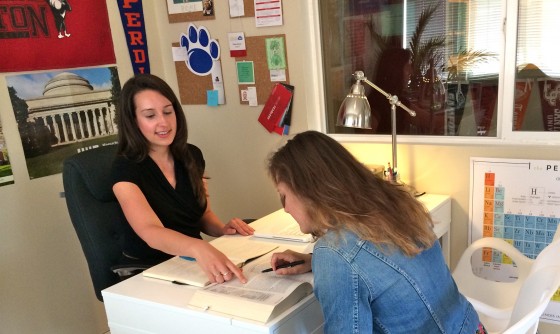College admissions season is in full swing. With a January 1 application deadline racing toward us, now is a great time to be brainstorming, creating, polishing and revising those essays. In September we published a blog post that provided a basic framework for how to write a killer college essay – and offered tips on how to incorporate the Outward Bound experience into the application. This month, we’re giving you another nudge – and a slightly different perspective from yet another expert.

Colleen Boucher
Meet Colleen Boucher – English language wordsmith and savvy expert on all things college-related. Based out of San Francisco, Boucher is a counselor for Collegewise – an independent college counseling company with 34 counselors in 22 cities across the country. Boucher helps students and their families create well-balanced college lists with a good range of reach, target, and safety schools; helps families maximize their financial aid awards; and manages all the deadlines and moving parts of an increasingly complex process. Boucher is also an essay specialist for Collegewise, which means she brainstorms with students, helps them identify their best stories, and makes suggestions for how to turn those into compelling narratives.
“When I finish working with a student,” Boucher explains, “my goal is that they feel as confident as possible about the work we’ve done together. If we’re tackling essays, I want them to feel like they’ve taken full advantage of the opportunity to share more about who they are…I want them to feel, whatever the admission decision, that they did everything they could, that they articulated as well as possible who they are, what they are looking for in a college, and what they would bring to a school’s community.”
“The essay is my favorite part of this process, hands down,” Boucher says. So we asked her for a few nuggets of wisdom. She shared with us 9 tips to writing a successful college essay:
1. Show us who you really are.
My colleague Arun has worked in admissions for U of Chicago and CalTech, and then as an admissions reader for UCLA. He’s probably read 20,000 application essays. He told me that when he would read through the application, he would ask himself, “Is this student qualified?” Can you handle the rigor of the courses, will you find things you’re intellectually excited about, will you contribute in the classroom? But when he read the essays, he would ask himself, “Would I have wanted this kid to be my roommate? What would it be like to eat with you in the dining hall, play ultimate Frisbee with you on the quad, hang out in the common room?” As my fellow counselor Casey says,
“The point of your application is to be impressive. The point of your essay is to be endearing.”
2. Share new information.
Admissions officers get a lot of information in your application: where you live, how many siblings you have, every class you’ve taken in high school, every grade you’ve gotten, and all your SAT, ACT, AP, and IB scores; awards you’ve won, activities you’ve participated in and how many hours a week you devoted to them. They get to hear what you’re like in the classroom from your teacher recommendations, and how you fit into the community of your high school from your counselor. Once they get to the essay they want to hear something new, so repeating information in your essay is a huge missed opportunity. Tell them about something that they can’t find anywhere else on your application, like your secret dream to be a stand-up comedian. Or tell them something new about a part of your life you’ve mentioned before, like how you made it your mission last year to raise enough money to buy sweatshirts for your softball team. Doing this gives colleges a fuller picture of how you spend your time, and how you’re likely to engage on their campus.

Colleen works with a student to craft the perfect college essay.
3. Own your story (and be yourself).
Talking about how being in marching band taught you the value of hard work isn’t your story; that could be anyone’s story. Talking about how helping people feel good isn’t original; everyone experiences that. It’s not that these things aren’t true. It’s just that admissions officers learn nothing new about you when you write something that anyone could claim. A lot of students feel anxious about this because they don’t feel like anything unique has happened to them. But everyone has a different perception of their experiences, and the more you can share that, the more you’ll stand out in that stack of applications. Nothing has more impact than just being yourself. I worked with a student last year who had played in the marching band all of high school, which is something thousands of students can claim. But she went into incredible detail about being exceptionally short compared to the rest of her bandmates, and how funny she must have looked behind her enormous drum; she shared how she was named drum captain her junior year, and wasn’t sure how to really be a leader in a male-dominated instrument; she talked about winning a drumming competition called a “drill down,” and how that helped her earn her bandmates’ respect without having to be the biggest or loudest person. Even if I happened to read another essay about being a drummer in the marching band, there’s no way I could confuse it with this one. These details belong only to this student, and they show us her leadership qualities rather than just telling us.

A student celebrates her experiences in the Blue Ridge Mountains.
4. Talk about how your Outward Bound experience helped you to become more independent, take risks, or maybe even what you learned from failing.
What I love about Outward Bound is that it gives students the opportunity to get outside their comfort zones. Going away to college is sometimes uncomfortable, so having the chance to practice being independent, taking risks, and maybe failing can be really good preparation for life after high school. I think programs like Outward Bound are great for students who aren’t sure they’re ready for a four-year college. This is a short-term opportunity to test the waters of college-esque independence.

Students step outside of their comfort zones while on an Oregon Rafting expedition.
5. Show that you care about what you did in high school.
One of my colleagues worked in admissions for MIT, and he always says the same thing when talking about activities:
“Colleges don’t care what you did in high school. They care that you care what you did in high school.”
It’s not enough to say that you’ve participated in football or band or Outward Bound. You have to express why you did those things, what made you want to get involved, and what you got out of it.
6. Talk about how Outward Bound impacted you, specifically.
Sharing that you participated in an Outward Bound program will help colleges understand how you’re spending your time outside the classroom. But you also have the opportunity to articulate to colleges why this experience is worth mentioning. I would encourage students to think about how participating in Outward Bound impacted them, specifically. Anyone who completes an Outward Bound expedition could say that they were challenged, that they weren’t sure they could do it, but on looking back, they feel proud of what they’ve accomplished. The real questions to ask are, why was it challenging for you, personally? How did it change you, specifically? What about this makes you feel proud, and how will you carry this into the next part of your life? Whether you write about it in your essay, or just list it as one of your activities, sharing the influence it has had on you, personally, will be much more impactful.
7. Avoid the vague, general and cliché.
I recently met a student who had gone on a trip with Outward Bound and wrote his essay about it. His essay was a perfect example of what I’ve mentioned above. He had clearly gotten a lot out of his Outward Bound experience. It had changed him fundamentally, and he was enthusiastic about sharing this story with colleges. But he fell into the same trap that a lot of students do, the trap of vagueness, generality, and cliché. Part of this comes from an understandable desire to impress colleges by using big words and manufacturing life lessons. I encouraged this student to focus on a smaller slice of his Outward Bound experience, one day or one event, and pull details from that specific experience: who was there? what did they eat? what wildlife did they see? When he looks back in fifty years, what’s the one thing he will still remember? Those answers built a much richer story.

Students experience an encounter with a mountain goat while mountaineering with Outward Bound.
8. Let your essay show your humor, self-awareness, individuality.
When students try to come up with something impressive, some big meaning, they all come up with the same thing: this activity taught me the value of hard work, taught me to overcome my fears, taught me to believe in myself. These things might be true, but they’re not going to make your essay stand out in the stack. Telling the story of how you didn’t think you could finish your first 10 mile hike, so your buddy had to bribe you with peanut butter pretzels every time you made it another half mile, and in doing so you made friends with a peckish squirrel (everything I know about nature I learned from Disney movies) might not seem like a big life lesson, but it’s a lot more interesting to read. And it helps colleges see you as a whole person. Let your application show that you’re hard working, that you’re pushing yourself, that you’re a leader.

A student celebrates his trek to the summit while mountaineering in Patagonia.
9. Talk about why you took a Gap Year with Outward Bound – and how it changed you.
Gap years are coming up more and more nowadays. I think they can be a great option for students who don’t quite feel ready to go away to school, students who are a little burned out from high school, students who need more time to figure out what they want to get out of their four years of college. Taking a semester or a year before diving into college life can help students go into their freshman year with confidence, maturity, and some real-world perspective. For students thinking about taking a gap year, I would encourage them to apply to colleges during their senior year. Teenagers change a lot from August to May, and while you might feel sure in the fall that you want to take time off, seeing all your friends making college plans might make you feel differently in the spring. One of the things that helps students feel in control of this process is having options. Being able to consciously choose to take a gap year feels a lot better than having to take one by default. Some schools will allow you to defer enrollment for a year, and if you reapply after taking a gap year, you’ll have new experiences and stories to share in your application.

Students backpack through Mantiqueira wilderness during the Florida Keys to Brazil Leadership Semester.
Many thanks to college counselor extraordinaire Colleen Boucher for her time and expertise. And now, for all the students who are reading… isn’t it time you got started writing?
To learn more about the Outward Bound learning approach, or to experience the transformative power of our expeditions, visit www.outwardbound.org or call 866.467.7651 to speak with an Admissions Advisor today. With a rich selection of expeditions, a wide variety of age groups, stunning locations across the country, and courses that run throughout the year, there’s an Outward Bound expedition for everyone.




